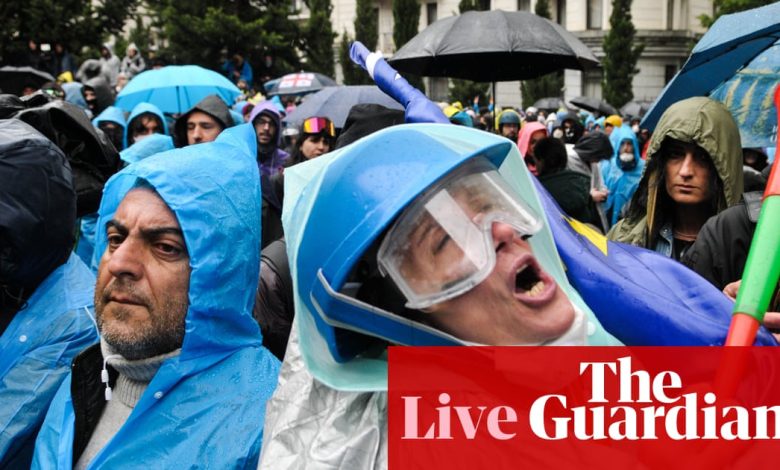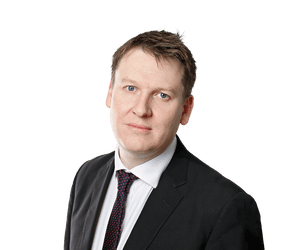EU condemns ‘intimidation, threats and physical assaults’ by authorities in Georgia – Europe live | Georgia

The EU condemns “intimidation, threats and physical attacks” in Georgia
Speaking at a press briefing, a spokesman for the EU’s top diplomat, Josep Borrell, reiterated his concern about the situation in Georgiawhere pro-Western protesters continue to face violent repression.
“We strongly condemn the acts of intimidation, threats and physical attacks against protesters, against civil society activists, against politicians and against journalists and media workers,” the spokesman said, referring to the “brutal actions” overnight.
“We call on the authorities to guarantee the right to protest,” he said. “We call on the authorities to investigate properly … and expect those responsible to be brought to justice.”
The European Union and member states are monitoring the situation “closely,” he said.
But he also said “we’re not there yet” on sanctions.
“At the end of the day, Georgia is a candidate country – and we again hope, expect and call on the authorities to return to the European path.”

Key events
Summary of the day
-
Protests continued in Georgia ahead of a key vote on the controversial “foreign agents” bill.
-
Riot police armed with water cannons and tear gas are accused of beating protesters who picketed outside Georgia’s parliament to try to stop the final vote.
-
The fresh scenes of violence came as hundreds of masked police attacked demonstrators trying to block access to parliament.
-
A group of members of the European Parliament asked the EU High Representative for Foreign Affairs, Josep Borrelll, “to begin preparing targeted sanctions against those in Georgia who are diverting the country from its European future.”
-
Speaking at a press briefing, a spokesman for the EU’s foreign policy chief said “we strongly condemn acts of intimidation, threats and physical attacks against protesters, against civil society activists, against politicians and against journalists and media workers”.
-
The centrist Renew Europe group in the European Parliament called on “EU institutions to take steps to further condemn the ruling party’s attempts to Putinize Georgia.”
-
The separatist parties were in danger of losing their decades of power in northeastern Spain Catalonia region, with the pro-union Socialist Party winning the most votes in Sunday’s election.
-
However, Carles Puigdemont said he intended to try to form a government made up of pro-independence parties.
-
Puigdemont told a news conference that the time had come to “rebuild bridges” in the independence movement and that repeat elections “would not be best for the Catalan people”.
-
Police intervened to end a pro-Palestinian protest at the University of Amsterdam today after protesters occupied university buildings in various Dutch cities.
Many students joined the protests in Georgia.
For the first time in my academic career, I was greeted by an empty room. Why? Because all the students are protesting against the Russian law in Georgia. ✌️ pic.twitter.com/alC3rfzmLs
— Georgi Melashvili 🇺🇦🇬🇪 (@geomel_ge) May 13, 2024
The centrist group Renew Europe in the European Parliament called on “EU institutions to take steps to further condemn the ruling party’s attempts to Putinize Georgia.”
The people of Georgia 🇬🇪 want a European 🇪🇺 future and we want it too!
We call on the EU institutions to take steps to further condemn the ruling party’s attempts to Putinize Georgia. #NotoRussianLaw pic.twitter.com/Zc0K2lTqvU
— Renew Europe (@RenewEurope) May 13, 2024
Police take action to end a pro-Palestinian protest at the University of Amsterdam
Police intervened to end a pro-Palestinian protest at the University of Amsterdam today after protesters occupied university buildings in various Dutch cities, Reuters reported.
Amsterdam police said the university filed a police report against the protesters for acts of vandalism.
City police also said they would ask protesters to leave the premises voluntarily.
De UvA heeft aangifte gedaan van vernieling door de demonstraten. Dörmö is de politie nu anweizte op het terrein om te zorgen dat niemand het pand meer in kan en de demonstraten wordt begevard het terrein te verlaan. Zij krijgen de kans dit vrijwillig en zelfstandig te doen.
— Politie Eenheid Amsterdam (@POL_Amsterdam) May 13, 2024
In a joint statement yesterday, over 100 Georgian civil society groups confirmed their opposition to the controversial “foreign agents” bill.
“We, the Georgian non-governmental organizations, once again state that the draft law adopted by the authorities in the second reading is a Russian law in its goals and content, it is directed against the Western course supported by the Georgian people, and must be withdrawn unconditionally . No amendment can reverse the devastating effects this law will have on our society,” they said.
“The government must withdraw this law unconditionally,” the groups added.
“64 seconds is all it takes for a constitutional coup,” the opposition United National Movement said today.
Georgian Dream approved the Foreign Agents Act in the last committee round in 64 seconds.
Without any opposition.
64 seconds is all it takes for a constitutional coup.
— United National Movement – Parliamentary Faction (@UNMFaction) May 13, 2024
Georgia has been rocked for weeks by demonstrations against a bill that would force non-governmental groups and media to register as “organizations serving the interests of a foreign power” if more than 20 percent of their funding comes from abroad.
Protesters say it will sabotage the country’s hopes of joining the EU and stifle civil society. It has been described as “Russian law” by critics as it resembles repressive legislation used by the Kremlin.
Police used tear gas and water cannons to disperse the crowds, sometimes using “disproportionate force,” according to observers.
Read the full explanation here.
A group of members of the European Parliament asked the EU High Representative for Foreign Affairs, Josep Borrelll, “to start preparing targeted sanctions against persons in Georgia which distance the country from its European future’.
🇬🇪🇪🇺 We ask HR/VP @JosepBorrellF to start preparing targeted sanctions against those in Georgia who are diverting the country from its European future.👇We will continue to support the pro-European people of Georgia. pic.twitter.com/9RKPDAF0ed
— Thijs Reuten 🇪🇺🌹 (@thijsreuten) May 13, 2024
Here are pictures from Tbilisi this morningby Alexander Bagrationi for the Guardian.
Tees Roitena member of the European Parliament from the Netherlands, said today that “we need to show that we are learning our lessons and supporting the Georgian people now”.
We need to show that we are learning our lessons and supporting the Georgian people now. Not next month, not next year.
Brave people on the streets of 🇬🇪 will continue to resist Russian-style sabotage of their democracy, constitution and EU integration. #NotToRussianLaw pic.twitter.com/WtQ7hEpLew
— Thijs Reuten 🇪🇺🌹 (@thijsreuten) May 13, 2024
Here are more images from Georgia today.
American and Russian citizens are detained in Georgia
Two American citizens and a Russian are among the 20 people detained at the protests in Tbilisi, the Interior Ministry announced today, Reuters reported.
Georgia police accused of beating protesters against ‘foreign influence’ bill.

Daniel Boffi
Riot police armed with water cannons and tear gas were accused of beating protesters who picketed outside Georgia’s parliament to try to stop a final vote on a controversial “foreign influence” law.
The fresh scenes of violence on Monday morning came as hundreds of masked police attacked demonstrators trying to block parliament in the capital, Tbilisi.
Dimitri Chikovani, who was severely beaten by five men near the entrance to his apartment building in Tbilisi’s Sololaki district last Wednesday evening, said he had also received threatening phone calls.
Speaking to the Guardian after his release from hospital, Chikovani, who suffered fractured cheekbones and a broken nose, said he believed the government was behind the attacks.
He said: “The issue is that people are afraid of them. But if I may add, it is pointless and useless. Because the people of Georgia, they have spoken, they have decided that the European way, Western civilization, is the way of Georgia. The Georgian dream will not stop him. We will protest until Georgian Dream backs down and stops the law.”
The EU condemns “intimidation, threats and physical attacks” in Georgia
Speaking at a press briefing, a spokesman for the EU’s top diplomat, Josep Borrell, reiterated his concern about the situation in Georgiawhere pro-Western protesters continue to face violent repression.
“We strongly condemn the acts of intimidation, threats and physical attacks against protesters, against civil society activists, against politicians and against journalists and media workers,” the spokesman said, referring to the “brutal actions” overnight.
“We call on the authorities to guarantee the right to protest,” he said. “We call on the authorities to investigate properly … and expect those responsible to be brought to justice.”
The European Union and member states are monitoring the situation “closely,” he said.
But he also said “we’re not there yet” on sanctions.
“At the end of the day, Georgia is a candidate country – and we again hope, expect and call on the authorities to return to the European path.”




